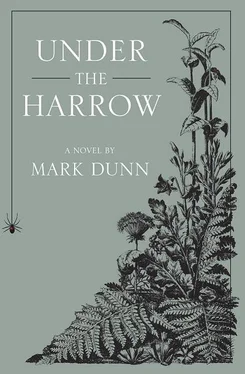I smiled and shook a finger at my friend Muntle.“It’s all brain chemicals, then, that make me want to help the Scadgers? Where is the human heart in all of this?”
“Oh it’s there, my friend. There are directive chemicals in that organ as well. It’s all chemical, you see. Humans are nothing but a slosh of chemicals orbiting an adamantine core of survival intuition. But recognise that it’s an inconvenient trait for a Dinglian to own, this investing oneself too deeply in the well-being of others.”
Muntle didn’t look at me as he gave voice to his opinion. He stared off into the distance — over the rooftops and church spires of the West End, out toward the Northern Ridge, topped, like a frothy dessert, by a fluffy creampuff of billowing clouds.
“And do you have some reason other than the most general for why it is an inconvenience to concern myself too fully with the concerns of others?”
“Besides the fact that it is debilitating, consider also that the day will come when none of it will make a difference. The day will come, sooner or later — it’s only a matter of time, dear chum — when all that we cultivate here for good or bad, in poverty or in luxury, will be gone.”
“And we shall all be dust,” I hurriedly added. “I’m quite aware of the mortality of man.”
Muntle shook his head. He turned to face me, pinning my gaze with the sharpness of his own look. “I don’t mean finality in the eschatological sense, Trimmers,” said he, “but in the much more immediate, specific sense of the future of the very soil upon which we presently stand — the Mother Valley — Dingley Dell.”
Muntle paused, his words apparently halted by a thought. It was, as I would soon come to realise, a most important thought, for there was a profound decision to be made; I could see the thing being contested through the windows of his eyes and in the now serious turn of his lip and the contemplative corrugation of his brow. Would he convey it or withhold?
The contest finished, the decision made, my friend Muntle, sheriff of Dingley Dell, leaned toward me and in a grave whisper disclosed the following: “This thing, you see, cannot last.”
“This thing ?”
“This construction, this fabrication — all that you see round you, Freddie. Dingley Dell.”
“My brother has made a similar claim in his more pessimistic moments.”
Muntle shook his head.“There is only incidental similarity, for Augustus doesn’t know half of what I know.”
I didn’t respond. It wasn’t clear to me at that moment Muntle’s meaning. I gave him leave through a silent nod to continue.
“Hear me, Trimmers. This place. Our valley. It’s a patently false construction. There are things about Dingley Dell that do not follow reason.”
I affected to laugh. “And since when has the sheriff of Dingley Dell taken up philosophy as a secondary vocation?”
Muntle ignored my flippant question and pursued in his raspy whisper: “These things, Trimmers, are being catalogued, are being anatomised, are being placed like tiles into a great mosaic, one by one, incrementally arranged. It is the big picture we are after, my friend.”
“The big picture?”
“Of who we are, what we are. Why we are here. For what purpose. To what end. And yes, finally: how it is all destined to end.”
“Muntle,” I said, in a deep tone, which surprised even me by the degree of its sobriety, “are you become mad?”
Ignoring the query, Muntle replied quickly and earnestly, “There are three others with whom I meet on a fairly regular basis. I would not call us a society per se; we’re quite an informal little gathering, but it is here in private conclave that we paste together, piece by piece, the bigger picture.”
“What do you mean by ‘bigger picture,’ Muntle?”
Muntle and I gained a bench, which overlooked the river and, more specifically, the bridge that crossed it — Westminster by name (after that famed London crossing). It was here upon the bench that one could see the beshadowed comings and goings of the poorest of the Dell — those without homes who refused to resign themselves to a life of rigourous and punishing regimentation at the workhouse. Here two, perhaps three dozen Dinglian vagrants — the “People-Under-the-Bridge” or, more unkindly, the “Trolls”—eked out a bare subsistence — more deprived and elemental than even that of the lowliest of the working poor of the East End of Milltown— scavenging from dustbins, dropping improvised lines and lures into this mud-coloured bend in the river. It was a hard and brutal life and one that shook my sensipath tendencies to their core.
Yet it was here, where one could see these miserable destitutes huddle and scuttle in the shadows, that Muntle wished to sit to deliver the second half of this most curious revelation about how he often chose to occupy his free time.
“We are universal skeptics, Trimmers. It is in our nature and it is our calling. My three friends and I don’t believe anything that has been told to us about this place. We question everything— from the details of our orphaned beginnings to the reason that you were not permitted to meet with the tradesmen at the Summit last week. We believe that everything has a false — a ‘veneer’ reason, if you will, and then a true reason beneath it, and we have made it our mission to learn all the true reasons and to patch them together into some unified theory as to why Dingley Dell is…well, Dingley Dell. ”
Muntle took a breath. We both watched in silence as a little boy standing upon the pebbles that overspread the eastern bank of the river threw sticks into its languorous current. The boy was drest in tatters, his face besmudged with grime. He smiled to see his little sticks go far, but betwixt the smiles there lay permanent lineaments of melancholy, for this was a boy with no hopefulness in his young heart, who could see nothing ahead for himself but a most bleak future.
“I want you to come next week, Trimmers. I want you to be a part of our little enquiring group. I’ve known you long enough to think that we could benefit from your own inquisitive mind.”
“Even if I don’t happen to think that there be something more to Dingley Dell than that which we see before us and that which we have always been told?”
“Are you being deliberately contentious? Can you possibly take everything you see about you at face value?”
“I don’t know. There are some nights that I lie awake in bed for hours asking myself those very questions. Other times I don’t care. I turn my concern to those things in our society that are broken and must be repaired in the here and the now.”
“But perhaps the imperfections you perceive in the here and now are intricately connected, hand-in-glove with all of the bigger, shrouded questions. I’ve heard you and Gus say it before — in fact, just the other day — questioning, for example, why the Petit-Parliament maintains such unassailable power within this valley. I’ve heard you ask time and time again why membership in that hegemonic body is limited only to those with great wealth and property. For we have no king, Trimmers, who was enthroned ‘by the hand of God.’ We are a government of men. Why should that government be a plutocracy rather than a democracy? Why is it the Parliament and not some more egalitarian governmental body that gets to decide where the goods that we take from the Terra Incognita should go — that decides who will be allowed to bid for them and who will not? Why, for example, does the greengrocer Jinkins receive nothing from the Outland that he may sell from his bins and shelves, but the fruitier Mortimer Riderhood, who owns the largest and best-stocked of those establishments, is given an exclusive contract to sell every banana and currant and fig and pine-apple that makes its way up the far side of the ridge? Why, for example, does your friend Pupker receive the best of the foreign herbs and spices and his competitors must settle themselves with the middlings? Why are Summit transactions conducted in such secresy that I was held at a distance of several hundred yards from the trading pavilion the other morning and was forced to ask my questions about your nephew in closely monitored interviews beneath a tree?”
Читать дальше












